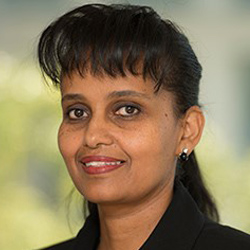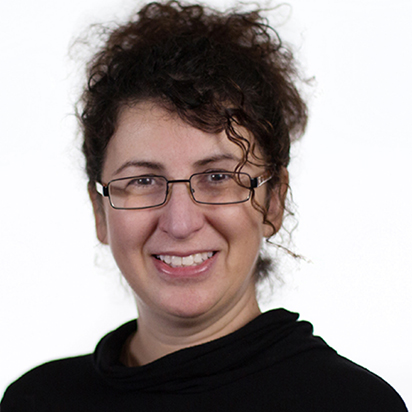This endeavor was started by Dr. (Prof) Seble Frehywot and Dr. (Prof) Yianna Vovides. It stemmed from three simple visions.
The first:
IT, in its various manifestations, can enhance equity for health and education systems, around the globe as it can offer the support mechanisms to do so.
The second:
Artificial intelligence is propagating and, if embraced, it can be useful within our expertise areas; however, if we, as experts in health and educations systems equity, do not partner with those working on the ai algorithms, the ai solutions implemented in these spaces may be detrimental.
The third:
More work/research needs to be done (including artificial intelligence based research) regarding various forms of e-pedagogy and e-andragogy to utilize e-learning as an equity tool for building Low and Middle Income Countries health and education systems .
ITfHESE Team

Dr. Seble Frehywot is a Professor of Global Health and Health Policy at The George Washington University (GWU) and the co-founder of the IT for Health and Education System Equity (ITfHESE) Initiative, an initiative between George Washington and Georgetown Universities. Through ITfHESE, since 2020, she works in the arena of Artificial Intelligence and Augmented Realities and their relationships and impacts on global health workforce education and training. She is also the co-founder of the Consortium of Pan-African Medical Diaspora (COPAMD) in the United States. In addition, for 6 years, until Sept, 2022, she was the Director of Health Equity On-Line Learning for the Atlantic Philanthropy Atlantic Fellows for Health Equity program. She has over 25 years of experience in international settings spanning in many countries in Asia, Africa, and the United States, and brings an in-depth knowledge of comparative health systems, communities of practice (CoP), medicine, health policy, and e-learning to the challenges of building the components of a health system. Her main work focus is in Lower and Middle-Income Countries. She has comprehensive knowledge of digital health technologies acquired and honed from over ten years of background in digital health education and technologies in low- and middle-income countries (LMIC). She also has a hands-on background in strategically coordinating with the public, other sectors, and health systems stakeholders (government
ministries, academia, non-governmental organizations, regulating bodies, and the private sector) with regard to health equity issues surrounding health workforce training, quality, and safety regulatory frameworks, pedagogy, e-pedagogy, and e-andragogy. She has worked as a Technical Core Group member for the World Health Organization, for the development of a number of WHO global guidelines and recommendations related to health systems, namely: the “Task-shifting Global Recommendation and Guidelines,” the “Increasing Access to Health Workers in Remote and Rural Areas through Improved Retention,” the “Transformative Scaling-up of Medical and Nursing and Midwifery Education,” and the “Optimizing the Delivery of Key Interventions to attain MDG 4 and 5.” Also, currently, she serves in a technical capacity on the WHO Digital Health Roster and the WHO Digital Education for Building Heath Workforce Initiatives. She has provided senior-level influence as a principal investigator and director for multimillion-dollar international projects, including for the United States funded Medical Education Partnership Initiative Project (MEPI), and has published a number of papers related to the health workforce and health systems as well as to the linkages with ICT. She teaches at The George Washington University both in an online and residential format the Global Comparative Health Systems, Global Health and Development, and Global Public Health Culminated Experience courses.
Dr. Yianna Vovides’ work intersects three areas – education, technology, and development. Over the last two decades, she has focused her practice and academic efforts in addressing how people learn within networked learning environments. She has worked on projects that emphasize individual and group learning, institutional programs that enable systemic changes, and research that examines how new technologies support teaching and learning. Professor Vovides currently serves as Senior Director of Learning Design and Research at the Center for New Designs in Learning and Scholarship (CNDLS), Professor for the Master of Arts in Learning, Design, and Technology (LDT) program at Georgetown University, and Curriculum Director for LDT, Georgetown University. In her role at CNDLS, she oversees the online learning, technology-enhanced, and development efforts. She has over 20 years of experience in higher education and has been instrumental in establishing programmatic efforts for university-wide services in online learning. Professor Vovides also serves as Curriculum Director for LDT. In this role, she convenes and seeks out input from both faculty and students on how to implement, adjust, and improve the curricular connections among courses across the program’s core courses and all tracks.


Dr. Chulwoo “Charles” Park is assistant professor in the Department of Public Health and Recreation at San José State University. He is a motivated global health scholar and professional with several years of both domestic and international fieldwork/research experience focusing on community and global health, refugee and immigrant health, control of infectious disease, and public health education in the United States, sub-Saharan Africa, and Southeast Asia. He worked as a global health fellow, family mentor, community health educator, graduate assistant, and peer advisor at various entities, such as World Vision, International Rescue Committee, and educational institutions. Through a strong background of both quantitative and qualitative method skills, he has published a number of peer-reviewed research articles about medical diaspora, Water, Sanitation, and Hygiene (WASH), Ebolavirus, ethnomedicine, and gender minority in low- and middle-income countries, the MERS outbreak in South Korea, and immigrant health among Korean American population in the Washington D.C. Metropolitan Area. In addition, he focused on the analysis of CEPH-accredited DrPH education in the United States to measure its impact and suggest the future directions. He was an exemplary airman and served on the reserve force of Republic of Korea Air Force.